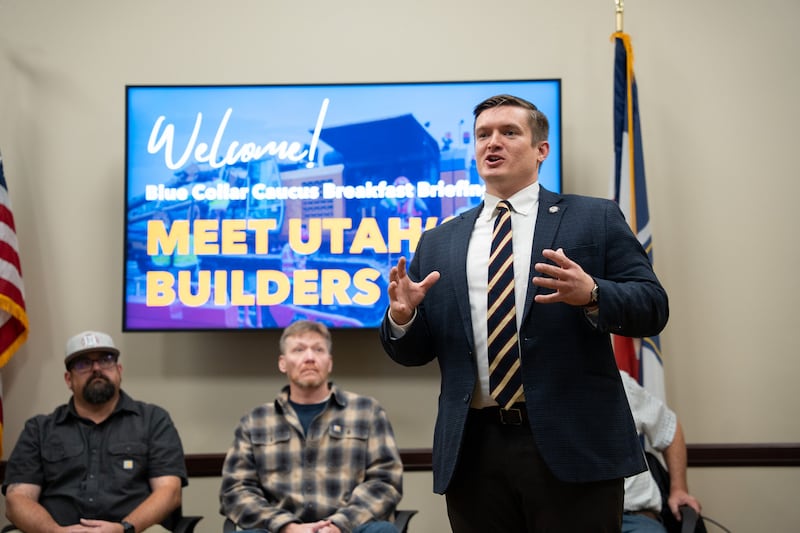Utah Rep. Tyler Clancy, R-Provo, wants the Beehive State to have a stronger construction workforce, and he’s exploring legislation to help make it happen.
Clancy discussed the potential legislation at a press conference Wednesday after a Blue Collar Caucus briefing, which gives lawmakers the chance to meet with blue collar workers to learn about their trades.
Specifically, Clancy is working to establish area standard wage policies for all publicly funded construction within the state based on the Department of Labor’s existing surveys of employers working in each county.
Area standard wage policies are supported by over 70% of Utah voters for public construction projects, according to a recent poll by the independent research firm Y2 Analytics.
Clancy said there’s “overwhelming bipartisan support” for this legislation.
“This bill is really about building it right the first time and making sure taxpayers are investing in quality work when it comes to our public infrastructure,” Clancy said. “Utahns overwhelmingly want to invest in public construction projects that have a high standard of quality.”
The other aspect of Clancy’s legislation, he said, is focused on affordability.
A Y2 Analytics’ poll found 79% of likely Utah voters prefer higher quality and 69% prefer higher safety standards over lower costs when it comes to public construction projects.
It doesn’t have to come at a higher cost, either.
Academic research shows construction projects completed with area wage standards are no more costly than those without. Additionally, 78% of Utah voters said they prioritize public projects that provide a fair wage to local workers over selecting the lowest-cost workers.
Clancy said his potential bill would be about restoring the ability to live a middle-class lifestyle and have a shot at the American dream through a “good union job.”
“What this bill will do is ensure that when we’re building contracts for state projects, up-front, that we’re saying, ‘We’re not going to undercut the local wage that already exists in those local communities,’” Clancy said. “If we’re building a road in St. George or a new courthouse in northern Utah ... we’re making sure that we’re not pricing people out of the market so that people have to come from Wyoming or Texas to build these types of projects. We want to invest it here.”
What the bill wouldn’t do, Clancy said, is create new administrative burden when it comes to project standards for contractors in Utah.
To him, it’s about living up to the public’s trust.
“Taxpayer money is a sacred stewardship that we have as policymakers. That’s hard-earned money from everyone’s paycheck. The idea that we would have taxpayers footing the bill on the front end by paying substandard wages for these public construction projects and folks working on it, but at the same time, an expanded social safety net because those same workers that we’re paying aren’t able to pay their bills. That doesn’t make sense to anyone,” Clancy said.
Clancy was joined by leaders from the state’s construction workforce to champion the legislation, which would help standardize the public bidding process for infrastructure projects and create a level playing field for Utah’s contractors while simultaneously supporting Utah’s workers.
“Having access to safe and skilled workers is a cornerstone of my business, and we need to create more opportunities for those kind of tradespeople in Utah’s construction industry,” said Bronson Thachery, a master plumber and owner of BRPI Mechanical. “This policy could be one step in the right direction to bring those opportunities to our community so our skilled tradespeople don’t have to travel outside our state for the pay they deserve.”
Keevan Kadel, a journeyman glazier, echoed Thachery’s support for the legislation.
“In my 20s, it was feasible to pursue this trade — I could get a house, my wife could stay at home and take care of our kids, we could buy a car. But the gap has gotten larger and larger. I don’t know how folks do it now, and we really need them in this trade,” Kadel said.

